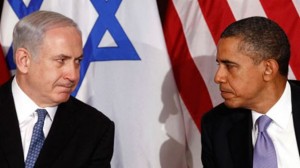
Therefore, to assess this political struggle it is imperative to take a closer look at the reasons behind the recent visit of Israeli Prime Minister Benjamin Netanyahu to the US and its results. One should note that this trip was made without a “special invitation” from the American President and pursued the sole goal of exploiting the tension around Iran’s nuclear program. Netanyahu aimed at awakening the “national awareness” of Jews living in the US so they would become concerned with Israel’s security matters and support his anti-Iranian posture.
It’s curious that the center-right Likud had a decent chance of winning the election on March 17, before its leader Benjamin Netanyahu ventured on this risky trip to America. The possible victory would have allowed Likud to form a new cabinet that could have been headed by Binyamin Netanyahu.
It’s a well known fact that the Jewish community in the US is unlike any other ethnic community (in comparison to other such communities like the Irish) due to its ability to solve various problems that are, in one way or another, related to the Jews. Although Jewish associations in the United States may have different positions on certain matters, still for the last 60 years up to 80% of the Jews in the United States have consistently voted Democratic. In recent years a number of prominent Republican politicians have put a lot of effort into an attempt to change this trend, yet no results have yet manifested themselves.
It is believed that the most influential Jewish organization in the United States is AIPAC (American-Israel Public Affairs Committee), since it has been lobbying for Israeli interests both in Congress and the US Administration. This organization has more than 100,000 active members, a total of two dozen regional offices and a breathtakingly long list of “sponsors”. Yet in the last 20 years AIPAC has become extremely conservative, therefore it has been promoting the policies of right-wing Israeli parties, in particular those of Likud.
Still, there’s another powerful Jewish unity in the United States – the Conference of Presidents of Major American Jewish Organizations, that unites more than 50 national Jewish organizations. But historically it has been dealing with Jewish problems in the US, therefore the support it could have provided to Likud is not as important as it could be.
But lately, a new lobby organization – J Street, which was created back in 2008 as a form of opposition to AIPAC, has been getting more and more popular in the US. It was founded by the former adviser to Bill Clinton – Jeremy Ben-Ami, and George Soros has been listed among its chief sponsors. This organization supports the campaign launched by President Barack Obama against the government of Benjamin Netanyahu and has managed to rally a number of liberal organizations and political parties both in Israel and the United States under its banners. While declaring its full support to Israel, J Street insists on the peaceful settlement of the Arab-Israeli conflict. This fact alone has created a lot of support for J Street among Jewish communities, Arabs living in the US, along with the representatives of business communities and other groups interested in a peaceful settlement of the Middle East crisis.
So, under these conditions, and in the wake of the deepening conflict between Obama and Netanyahu on numerous issues concerning the approaches to the security of the Middle East, the Israeli Prime Minister on March 3 delivered a speech in front of a joint session of the US Congress. In his speech, Benjamin Netanyahu put major emphasis on the need to dissuade US lawmakers from approving an agreement with Iran on its nuclear program, which the Obama administration plans to draft by the end of March.
Thus, Netanyahu has not just made an attempt to significantly undermine Washington’s efforts of reaching a peaceful settlement of the Iranian problem, but has also cast a blow to the credibility of Barack Obama. Hence it is no wonder that most of the Jewish communities in the United States, that support Democrats, have been criticizing Netanyahu’s move, while signing petitions against him.
In Israel, a similar critical evaluation of Netanyahu’s visit to the US has not been simply voiced by numerous politicians and public organizations, it has even been expressed by the representatives of the Israeli secret services. The Israeli intelligence agency Mossad does seem to be sharing the views expressed by Prime Minister Netanyahu in 2012, on Iran’s capability to create a nuclear bomb “in a year”, this fact was established the British newspaper The Guardian. A former head of the Israeli intelligence service Meir Dagan said bluntly that Netanyahu’s policy is leading Israel to a disaster.
In these difficult conditions, a significant number of American Jews, whose connections with Israel have worn off over the years, sided with Obama and the Democratic Party. An increasing number of publications that followed Netanyahu’s visit express a position that the sitting Israeli government must be replaced with a more predictable one that won’t challenge Obama’s policies.
As for the Republicans, Netanyahu’s “performance” in Congress is unlikely to fundamentally change the sympathies of the Jews living in the US, they would remain loyal to the Democratic Party. However, it is safe to note that this speech has hurt bilateral relations between the US and Israel even more, despite Israeli Prime Minister claims in front of US lawmakers that “the union of Israel and the US is stronger than ever.”
Valery Kulikov, political analyst, exclusively for the online magazine “New Eastern Outlook”.
